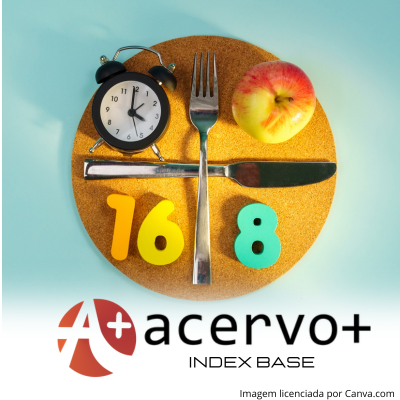Benefícios da dieta que imita o jejum na demência causada pelo alzheimer
##plugins.themes.bootstrap3.article.main##
Resumo
Objetivo: Descrever os benefícios da dieta que imita o jejum no tratamento da Doença de Alzheimer. Revisão bibliográfica: A Doença de Alzheimer é um distúrbio neurodegenerativo, progressivo e multifatorial, caracterizado pelo declínio das funções cognitivas. Nesse contexto, destaca-se a dieta que imita o jejum, conhecida por sua restrição calórica e ingestão de alimentos exclusivamente à base de plantas, englobando alimentos com níveis baixos de açúcar, proteínas e níveis altos degordura insaturada. Essa dieta visa reproduzir os efeitos do jejum em um indivíduo que está se alimentando. Seus efeitos sobre o organismo ocorrem por meio da ativação de uma via metabólica alternativa, trazendo benefícios notáveis, como a redução da inflamação, a promoção da autofagia e limpeza celular, redução da beta-amilóide além da diminuição do estresse oxidativo. Considerações finais: A dieta que imita o jejum contribui para a melhoria da demência causada pela doença de Alzheimer, indicando uma possível opção de tratamento.
##plugins.themes.bootstrap3.article.details##
Copyright © | Todos os direitos reservados.
A revista detém os direitos autorais exclusivos de publicação deste artigo nos termos da lei 9610/98.
Reprodução parcial
É livre o uso de partes do texto, figuras e questionário do artigo, sendo obrigatória a citação dos autores e revista.
Reprodução total
É expressamente proibida, devendo ser autorizada pela revista.
Referências
2. BRANDHORST S, et al. A periodic diet that mimics fasting promotes multi-system regeneration, enhanced cognitive performance, and healthspan. Cell Metabolism, 2015; 22: 86–99.
3. BRANDHORST S, et al. Fasting-mimicking diet causes hepatic and blood markers changes indicating reduced biological age and disease risk. Nature Communications, 2024; 15(1).
4. CALSOLARO V e EDISON P. Neuroinflammation in Alzheimer’s disease: Current evidence and future directions. Alzheimer’s & dementia: the journal of the Alzheimer’s Association, 2016; 12: 719–732.
5. CHOI IY, et al. Nutrition and fasting mimicking diets in the prevention and treatment of autoimmune diseases and immunosenescence. Molecular and Cellular Endocrinology, 2017; 455: 4–12.
6. DE GROOT S, et al. Fasting mimicking diet as an adjunct to neoadjuvant chemotherapy for breast cancer in the multicentre randomized phase 2 DIRECT trial. Nature communications, 2020; 11(1): 3083.
7. DENG Y, et al. Alzheimer’s disease with frailty: Prevalence, screening, assessment, intervention strategies and challenges. Bioscience trends, 2023; 17: 283–292.
8. GOURAS GK, et al. β-Amyloid peptides and amyloid plaques in Alzheimer’s disease. Neurotherapeutics: the journal of the American Society for Experimental NeuroTherapeutics, 2015; 12: 3–11.
9. GUTIERREZ BAO, et al. Economic impact of Alzheimer’s Disease in Brazil: is it possible to improve care and minimize costs? Ciência & Saúde Coletiva, 2014; 19: 4479–4486.
10. GRANT WB e BLAKE SM. Diet’s role in modifying risk of Alzheimer’s disease: History and present understanding. Journal of Alzheimer’s disease: JAD, 2023; 96(4): 1353–1382.
11. JIANG Z, et al. Effects of ketogenic diet on neuroinflammation in neurodegenerative diseases. Aging and Disease, 2022; 13(4): 1146.
12. KHAN S, et al. Recent advancements in pathogenesis, diagnostics and treatment of Alzheimer’s disease. Current Neuropharmacology, 2022; 18: 1106–1125.
13. LEI P, et al. The essential elements of Alzheimer’s disease. The Journal of Biological Chemistry, 2020; 296: 1-28.
14. LI T, et al. Fasting-mimicking diet alleviates inflammatory pain by inhibiting neutrophil extracellular traps formation and neuroinflammation in the spinal cord. Cell communication and signaling: CCS, 2023; 21(1): 2-25.
15. LOBO F, et al. The effects of dietary interventions on brain aging and neurological diseases. Nutrients, 2022; 14: 5086.
16. LONGO V. The longevity diet: Slow aging, fight disease, optimize weight. Nova Iorque, NY, USA: Avery Publishing Group, 2019; 45p.
17. LONGO V, et al. Intermittent and periodic fasting, longevity and disease. Nature Aging, 2021; 1: 47–59.
18. MATTSON MP, et al. Impact of intermittent fasting on health and disease processes. Ageing research reviews, 2017; 39: 46–58.
19. PHILLIPS MCL. Fasting as a therapy in neurological disease. Nutrients, 2019; 11: 2501.
20. RANGAN P, et al. Fasting-mimicking diet cycles reduce neuroinflammation to attenuate cognitive decline in Alzheimer’s models. Cell reports, 2022; 40: 111417.
21. SCHELTENS P, et al. Alzheimer’s disease. Lancet, 2021; 397 1577–1590.
22. SOARES NM, et al. Economic impact and prevalence of Alzheimer’s disease in a Brazilian capital. Ciência & Saúde, 2017; 10: 133.
23. STRAC DS, et al. Personalizing the care and treatment of Alzheimer’s disease: An overview. Pharmacogenomics and Personalized Medicine, 2021; 14: 631-653.
24. TAHAMI MAA, et al. Alzheimer’s disease: Epidemiology and clinical progression. Neurology and Therapy, 2022; 11: 553–569.
25. ZHANG J, et al. Intermittent fasting protects against Alzheimer’s disease possibly through restoring aquaporin-4 polarity. Frontiers in Molecular Neuroscience, 2017; 10.
26. ZENG Z, et al. Fasting, a Potential Intervention in Alzheimer's Disease. Journal of Integrative Neuroscience, 2024; 23(3): 50.

